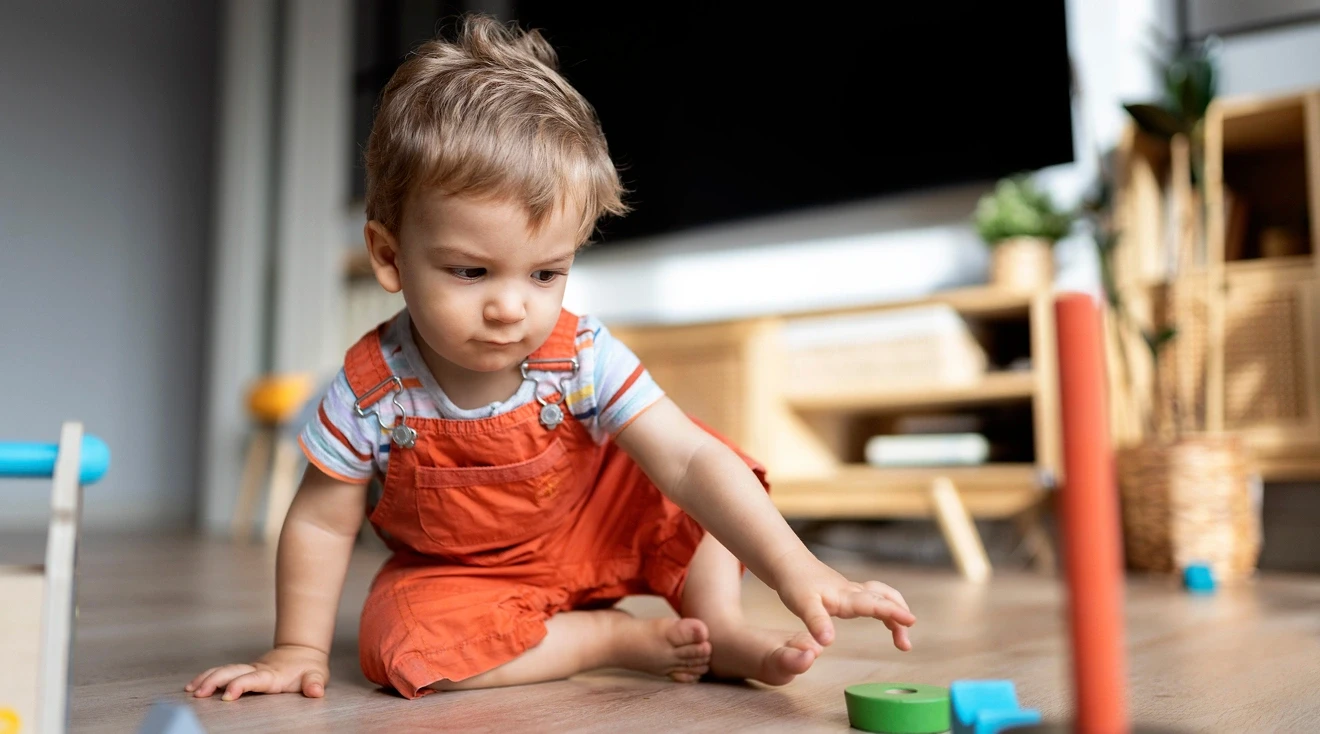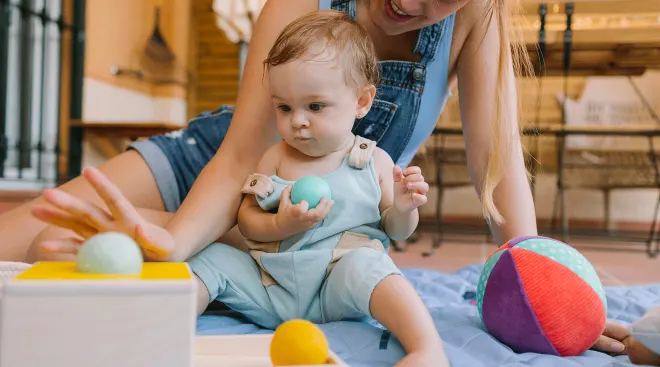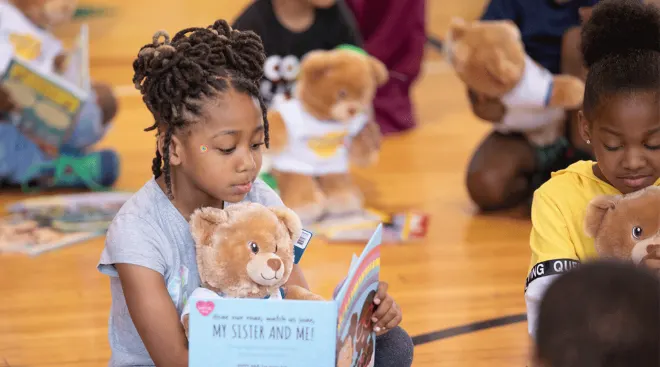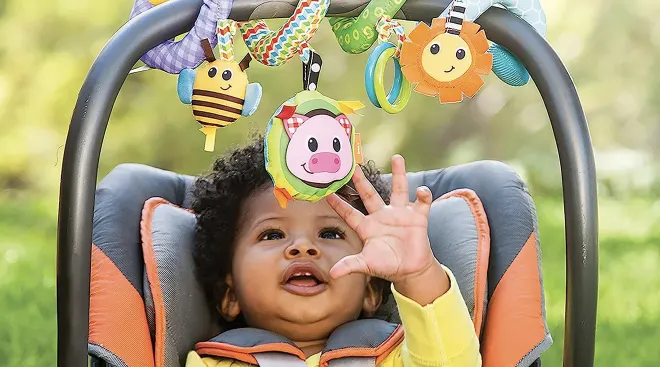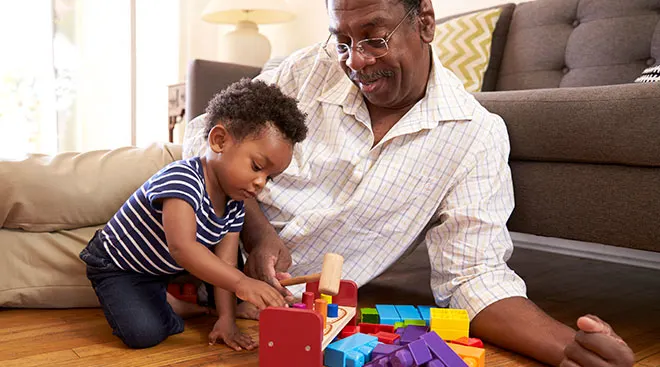Why Is Solitary Play Important for Babies and Toddlers?
Playing with baby can be exciting—watching their eyes light up as they discover something new. Moreover, engaging with your little one has a plethora of benefits, whether you’re stacking blocks together, playing dress up or tossing around a ball. But, while quality one-on-one time is important for young children, so is solitary play (aka independent play). So how do you get your kiddos to enjoy solo playtime activities? Read on for expert intel.
Solitary play is exactly what it sounds like: It’s basically solo engagement without the involvement of another person. It’s the second stage of Mildred Parten’s six stages of play, which charts childhood development during the journey from playing alone as a baby to playing with other kids as a preschooler. Solitary play is a crucial part of a child’s social, cognitive and personal development. But it’s important to note that just because baby is playing independently doesn’t mean they shouldn’t be supervised by a caregiver. “For young children, independent play doesn’t mean play in isolation, but rather when a child explores on their own for a given length of time,” explains Gabrielle Felman, LCSW, an early childhood development specialist with Lovevery. “Babies and toddlers thrive most by playing in the presence of a beloved caregiver, but you can promote independent play by letting there be time when you’re an observer versus an active participant.” (More on this below.)
So, how is independent play good for babies? Baby and toddler independent play offers children valuable time for growth and learning. Not only is it the beginning of their path toward social development, it also helps them discover a sense of self. Below, some of the benefits of independent play for babies and toddlers:
-
Builds independence: Learning how to thrive alone is an essential skill to have in life—and it can start with solitary play. “Solitary play helps with being comfortable being alone, with personal self-expression, without an audience or partner,” says Jephtha Tausig, PhD, a New York City-based clinical psychologist. Felman agrees, adding that it also helps little ones learn how to focus and develop a sense of agency.
-
Boosts cognitive development: Donna M. Volpitta, EdD, a childhood education expert and the founder of the Center for Resilient Leadership, notes that solitary play is a great opportunity for babies and toddlers to think creatively, use their imagination, learn how to deal with frustration and gain problem-solving skills through trial and error. “Solitary play gives them time to wonder and think about their world,” she says. “When they’re constantly engaged in activities that are coached or guided, they don’t have the opportunity to develop these skills.”
-
Helps social development: Solitary play is the first step to building connections and learning how to interact, says Julia Simens, MA, a clinical clinical psychologist and author of Emotional Resilience and the Expat Child. Before baby can play with other children, they need to play alone, as this helps them learn more about their personal preferences. “Play is like most things—you don’t just learn to be a ‘great player’ without a lot of practice. Kids developmentally need solitary play,” she adds. Soon after this phase comes parallel play, in which kids play side-by-side, instead of together, Simens explains.
Essentially, solitary play helps children learn the tools they’ll need to eventually become successful and independent children and adults.
Experts are divided on when exactly babies can start to engage in solitary play. Simens points to the six- to eight-month mark as a good time for independent play, because it’s when babies can start sitting up and holding items. Volpitta, on the other hand, believes babies can start to engage in solitary play once they’re able to focus with their eyes. “When we give babies something to engage with, they often employ ‘solitary play’ by watching and wondering for several minutes,” she explains. Meanwhile, Felman believes that even newborns can start independent play habits through baby-safe spaces.
Wondering what solitary play looks like for babies and toddlers? “For babies and toddlers, independent play is any play that your child is engaging in by themselves with an adult nearby and observing,” Felman says. For younger babies, exploration will probably mean mouthing, throwing and banging toys together. For older babies and toddlers, it may be stacking toys or flipping through a book. She offers the following examples of solitary play for babies and toddlers:
- Engaging in tummy time and looking in a mirror
- Laying on a playmat—maybe one with toys they can bat at
- Gnawing on a teething toy
- Stacking toys, like blocks
- Looking through a book with bright colors and pictures
- Playing with a doll or stuffed toy
“The ability to play independently is a combination of development, temperament and environment,” Felman says. “For babies and toddlers under 3, it’s important to keep expectations about independent play realistic.” Most kids this age will likely only be able to play by themselves for up to five minutes at a time at first before they “need a refuel from a caregiver.” This could be simply looking at you for acknowledgement or reassurance, or just coming in for a quick hug and cuddle. There are ways to increase this time frame, but “it’ll take practice and loving boundaries on the part of the caregiver,” Felman adds. It’s best not to try to get baby to engage in solitary play at certain times of the day, like during mealtimes, nap times or if they’re already fussy. “It’s important to follow your child’s lead when it comes to their tolerance for independent play,” says Felman.
Wondering how to help your child explore independently with solitary play? It’s easier than you think—and you may already be doing some of these things. Here, expert tips on how to encourage solitary play in beneficial and developmentally appropriate ways.
-
Understand what your child needs: “I think it’s important that we have a sense of who our children are as individuals,” Tausig says. “Some may gravitate more towards solitary play, and some may need some gentle encouragement to play and engage with others…We’re all different in this regard.”
-
Keep play simple and unstructured: For successful solitary play, kids need developmentally appropriate toys that are interesting to them. “If a [toy] is too difficult, it’ll be harder for independent play to take place,” Felman says, as this “will likely cause frustration and require a caregiver to support the play.” Instead, offer your child simple toys, like blocks, or kid-safe household objects like pots, pans and cardboard boxes—anything that’s safe and gives them choices in how to use the objects in their play. “Open-ended materials and play things allow a child to explore in many different ways and hold their attention for longer,” Felman says. Volpitta agrees, adding that unstructured playtime is often most beneficial for solitary play in babies and toddlers. Keep in mind baby doesn’t need more than three or four developmentally appropriate objects to spark their exploration. “Fewer toys encourage children to go deeper with their play,” Felman says. (However, the addition of a new toy every now and then may also “peak interest and motivate some independent exploration,” she adds.)
-
Create a “yes space:” So often babies and toddlers hear the word “no” from caregivers because something that’s caught their eye is dangerous. Felman suggests giving them a “yes space” for solitary play where nothing is off-limits. This space should let them play and scoot without fear of getting hurt. “Giving them a space where they’re encouraged to explore without restrictions builds their attention span and supports independent play,” Felman says. To ensure baby’s safety, try enclosing a room or part of one with a baby safety gate; anchor large furniture to the walls; move exposed cords, plants and decor out of reach and cover any outlets. “Reevaluate the space as your child gets older to keep an eye on any dangers that may arise due to their physical growth and developing skills,” Felman advises. (Even within the “yes space,” little children should always be supervised, and you’ll want to babyproof any area of the home your child plays in.)
-
Make it a routine: At first, baby won’t be able to play independently for very long. But if you want to increase your little one’s ability to do so, start with a short amount of time and then build on it every day. Felman suggests having baby play independently (perhaps in their “yes space!”) around the same time every day. Let them know you’ll be nearby and watching, but don’t try to push it if your little one is fussy or starts crying. And keep in mind that the process for building stamina for solitary play will look different for each child. “It may even look different for your child on different days,” Felman says. “Stay patient and remember that babies and toddlers learn best in the company of a beloved caregiver.”
-
Act as an observer: It can be hard to sit back and resist the urge to help baby figure something out—but it’s an important part of solitary play. As long as baby is safe, “give your child the time to do it themselves,” Simens says. However, be sure to respond to your child if they look at you or want a quick cuddle. Setting these boundaries around how you interact with your child when they’re playing independently will make it easier on both of you.
Ultimately, every child’s experience with solitary play will be different, depending on their personality and your parenting style. Above all else, Felman emphasizes being patient: Like so many other things, solitary play “is a learned skill that grows over time.”
Please note: The Bump and the materials and information it contains are not intended to, and do not constitute, medical or other health advice or diagnosis and should not be used as such. You should always consult with a qualified physician or health professional about your specific circumstances.
Plus, more from The Bump:
Gabrielle Felman, LCSW, is an early childhood development specialist and the director of childhood development for popular kids’ toy brand Lovevery’s. She earned her master of science degree in early childhood education from Bank Street College of Education, as well as her master of science degree in clinical and medical social work from Columbia University. She completed a clinical residency at New York Presbyterian Morgan Stanley Children’s Hospital.
Julia Simens, is an educator and the author of Emotional Resilience and the Expat Child. She holds a bachelor’s degree in psychology and education from Chaminade University in Honolulu, Hawaii, as well as a master’s degree in clinical psychology.
Jephtha Tausig, PhD, is a New York City-based clinical psychologist with over 20 years of experience. She has a master’s of philosophy degree in clinical psychology from Columbia University, a master’s of clinical psychology degree from Teachers College and a master’s of general psychology degree from New York University. She earned her doctorate in clinical psychology from Columbia University.
Donna M. Volpitta, EdD, is the founder of The Center for Resilient Leadership and the co-author of The Resilience Formula: A Guide to Proactive, Not Reactive, Parenting. Previously, she has served as a classroom teacher and in the department of teaching at Teachers College, Columbia University. She holds a master’s of education degree in special education from Boston University and a doctoral degree in learning disabilities from Teachers College, Columbia University.
Learn how we ensure the accuracy of our content through our editorial and medical review process.
Navigate forward to interact with the calendar and select a date. Press the question mark key to get the keyboard shortcuts for changing dates.
































